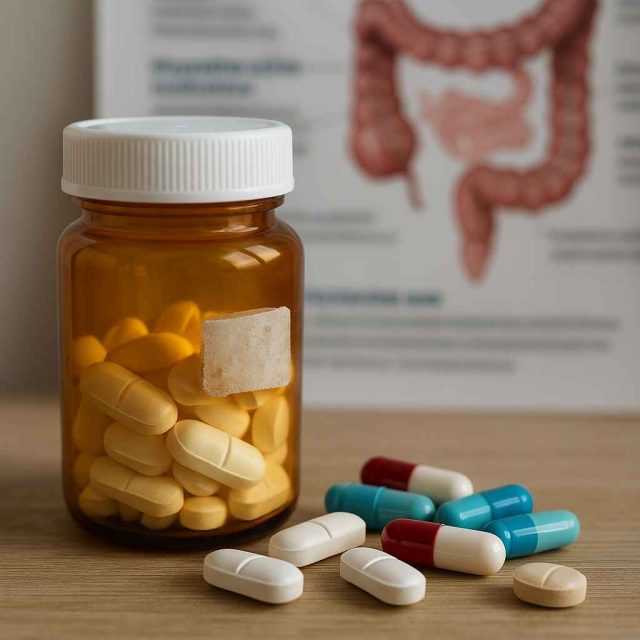
Managing a chronic illness like ulcerative colitis (UC) can feel overwhelming, especially when it comes to selecting the right treatment. With many available options, understanding the role of different ulcerative colitis drugs is key to building a personalized and effective care plan.
Whether you’re newly diagnosed or exploring alternatives due to side effects or a flare-up, this article offers a comprehensive look at medication types, how they work, and what patients can expect.
Table of Contents
- Aminosalicylates (5-ASAs)
- Corticosteroids for Acute Flares
- Immunomodulators and Biologics
- Janus Kinase (JAK) Inhibitors and Emerging Therapies
Aminosalicylates (5-ASAs)
For many with mild to moderate UC, aminosalicylates are the first line of defense. These anti-inflammatory drugs help reduce inflammation in the lining of the colon by inhibiting certain chemical pathways. Medications in this category include mesalamine (brand names: Asacol HD, Lialda, Pentasa) and sulfasalazine.
While mesalamine tends to have fewer side effects, sulfasalazine may be more cost-effective. That said, not all patients tolerate these drugs well, especially those sensitive to sulfa-based compounds.
Typically administered as oral tablets, rectal suppositories, or enemas, 5-ASAs target the inflammation directly where it occurs. This localized approach often allows for effective symptom relief without widespread immune suppression.
Patients are usually maintained on 5-ASAs long-term to prevent flares. However, those who don’t respond to these drugs may require escalation to stronger therapies.
Corticosteroids for Acute Flares
When symptoms intensify, corticosteroids such as prednisone, hydrocortisone, or budesonide may be prescribed. These medications work quickly to suppress the immune system and reduce inflammation.
Unlike aminosalicylates, corticosteroids are not intended for long-term use due to their serious side effect profile. Risks include osteoporosis, weight gain, mood changes, high blood pressure, and increased infection susceptibility.
Doctors may prescribe corticosteroids orally or intravenously during severe flare-ups. Once symptoms improve, patients are tapered off to minimize dependency.
Although effective in the short term, repeated steroid use can lead to steroid-refractory disease, prompting a transition to immunomodulatory or biologic therapies.
For detailed patient stories and treatment experiences, visit Health.HealingWell.com.
Immunomodulators and Biologics
If 5-ASAs and steroids fail to control symptoms, immunomodulators may be considered. These medications work by modifying the immune system’s response. Common agents include azathioprine (Imuran) and 6-mercaptopurine (6-MP).
Immunomodulators take weeks to months to become fully effective. During this period, patients often remain on other drugs to manage symptoms. Regular blood monitoring is essential, as these drugs may impact liver function and white blood cell counts.
Biologics represent a newer class of ulcerative colitis drugs designed to target specific immune pathways. These include:
- Infliximab (Remicade)
- Adalimumab (Humira)
- Vedolizumab (Entyvio)
- Ustekinumab (Stelara)
Each of these medications works differently. For instance, Remicade and Humira block tumor necrosis factor-alpha (TNF-α), a protein involved in systemic inflammation. Entyvio targets gut-specific pathways, potentially reducing systemic side effects.
Biologics are typically administered through infusions or injections. Because they suppress the immune system, patients are at increased risk for infections and may require screening for tuberculosis or hepatitis before starting treatment.
For some patients, combining a biologic with an immunomodulator improves efficacy, though it may also increase risks. Your care team can help weigh the benefits and potential complications.
Janus Kinase (JAK) Inhibitors and Emerging Therapies
In recent years, oral small-molecule drugs like tofacitinib (Xeljanz) and upadacitinib (Rinvoq) have entered the scene. These Janus kinase inhibitors target specific enzymes involved in the immune response.
Unlike biologics, JAK inhibitors are pills, offering convenience and fast onset of action. However, they also carry warnings for serious side effects such as blood clots, cardiovascular events, and infections.
The FDA continues to monitor these drugs closely, particularly for use in high-risk populations. They may be ideal for patients who cannot tolerate injections or need rapid symptom relief after other therapies have failed.
Pipeline therapies are also on the horizon. S1P receptor modulators and microbiome-based treatments are under investigation, showing promise in clinical trials. Staying updated on the latest innovations ensures patients and providers can explore evolving options.
For more on emerging UC treatments, visit Healthcare.pro.
Conclusion
Navigating the landscape of ulcerative colitis drugs requires a collaborative and informed approach. While no one-size-fits-all solution exists, understanding the available options empowers patients and clinicians to tailor treatment to individual needs.
Whether starting with 5-ASAs, stepping up to biologics, or exploring the potential of JAK inhibitors, it’s essential to weigh the risks and benefits of each choice. Equally important is ongoing monitoring and adjustment, as the disease course may shift over time.
Ultimately, combining medical management with lifestyle strategies and strong provider relationships offers the best path toward symptom control and improved quality of life.
FAQs
What is the best medication for ulcerative colitis?
There’s no universal “best” drug. Treatment depends on disease severity, patient history, and response to past medications.
Can ulcerative colitis drugs cause side effects?
Yes. Side effects vary by drug class and may include immune suppression, liver changes, and gastrointestinal discomfort.
How long do UC drugs take to work?
5-ASAs and steroids often work within days, while immunomodulators and biologics may take weeks to months.
Are biologics safe for long-term use?
Biologics are generally safe under medical supervision but do carry risks of infection and other complications.
What happens if medications stop working?
If a drug becomes less effective, doctors may adjust the dosage, switch therapies, or explore combination treatments.
This content is not medical advice. For any health issues, always consult a healthcare professional. In an emergency, call 911 or your local emergency services




